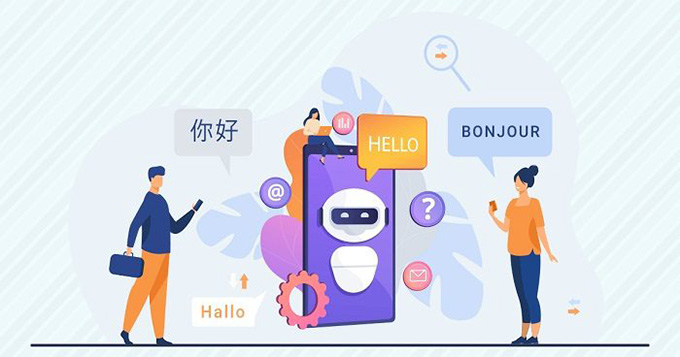
Is it still useful to learn foreign languages when we have smartphones equipped with automatic translators? If this hypothesis is worrying, it would seem that artificial intelligence also opens new avenues for learning different languages.
In 2024, artificial intelligence company Open AI introduced GPT4-o, a new large language model capable of “reasoning” and interacting with text, images, and sounds.
In one of the videos released after the launch, two people are seen on their cell phones asking GPT4-o to listen to them and translate their conversations from English to Spanish or from Spanish to English, so that each can communicate using what applied linguistics calls their L1, or native language.
In another video, two people have a conversation with GPT4-o, which is shown to be able to change the tone of its voice and adapt to the interlocutors’ requests about the direction of the conversation.
Phones that “speak” all languages?
For those of us who, like us, had a poster of C-3PO in their room, the Star Wars droid capable of understanding and speaking millions of languages, the content of these two videos might seem insignificant. However, this is far from being the case.
The ease with which interlocutors use their own device to communicate naturally implies a before and after in the way we interact with new technologies. We pick up our phone, speak in our native language (L1) and manage to communicate with a person who does not speak our language and whose language we do not speak.
Two questions then arise: what is the point of learning a foreign language if our phone can “speak” and “understand” them all? What is the role of language teaching in this context?
On the use of artificial intelligence in language learning, there are two schools of thought: the first, willingly catastrophic, perceives AI as a threat that will end up destroying language learning as it is practiced today; the second sees AI as an opportunity to promote digital literacy while developing students’ critical thinking with regard to its uses.
Catastrophic Hypotheses: The End of Language Learning
Catastrophic hypotheses attribute absolute power over human behavior and society to new technologies. Language learning is no longer of any interest; it is reserved for specialists and scholars, as in Isaac Asimov’s series of novels Foundation , where all human knowledge, including all the languages spoken in the different galaxies, is preserved by a sort of university foundation.
Since the 1970s, computer-assisted language learning has been shaped by behaviorist theories that encouraged programmed instruction, repetition exercises, and emphasized the importance of reinforcement . In this regard, a computer is tireless; it can correct the student thousands of times. In this paradigm, the superfluous element is the teacher, supplanted by the computer.
Inclusive hypotheses: a renewed language teaching
Other hypotheses propose a future in which artificial intelligence would contribute to the learning and use of foreign languages, integrating our computers and mobile devices to help us write emails, extract and summarize information more quickly, create specialized lexical lists, obtain advice on specific lexical and grammatical uses or, among other functions, improve texts based on our indications.
All this will come with new challenges. First, language learning has so far been defined by a set of practices regulated by official institutions, such as the Ministry of Education, schools and universities.
Formal learning is wary of generative AI because it challenges the current model that requires students to produce oral or written texts to be assessed by the teacher.
Second, informal language learning is booming, a phenomenon that AI will help to sustain. Open access to millions of open resources and mobile applications like Duolingo have been competing with formal learning since the Covid-19 pandemic. According to data provided by Duolingo , Spanish is the second most studied language in the world and accounts for 17% of the application’s users. This learning, I remind you, is taking place outside the educational system.
Finally, while we do not yet know how AI will change our relationship with reading and writing, we can nevertheless affirm that it will revolutionize our conception of teaching and learning practices, and will lead to changes as radical as those that followed the appearance of the Internet at the end of the 20th century . In this hypothesis, the critical capacity of students in the evaluation of the products of generative AI will play an essential role.
Language knowledge important for personal training
Although it is not impossible that new technologies will eliminate language barriers between human beings in the distant future, language learning will remain a central activity of formal education in the coming decades.
Professionally, knowledge and use of multiple languages will remain a key skill in a wide variety of cultures, including corporate cultures. Furthermore, applied linguistics has demonstrated that learning languages improves our analytical abilities, including our ability to extract rules and usages, as well as our innate capacities for abstraction and generalization.
One thing is certain: used critically, generative AI will offer many possibilities to deepen the learning and use of foreign languages, in the classroom and elsewhere.
Author Bio: Pascual Perez-Paredes is a University Professor in Applied Linguistics and English Linguistics at the University of Murcia
